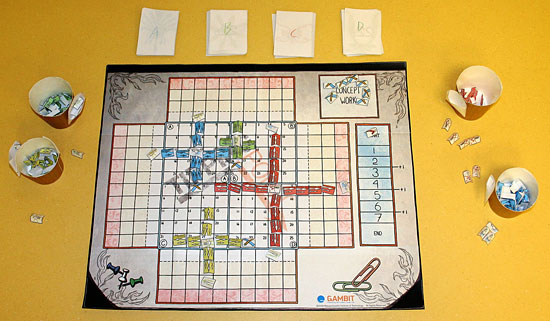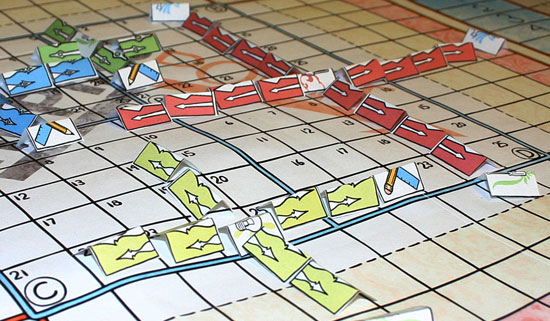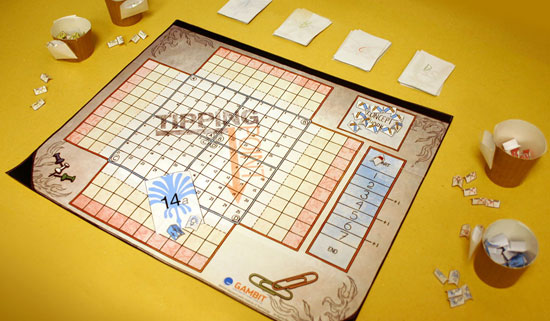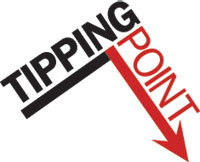Tipping Point is unique among our games for several reasons. First, this game has our lowest set of system requirements so far: paper, a color printer, scissors and tape. (Or glue. We're not picky.) Although we frequently develop paper prototypes for our video games as they're being developed, Tipping Point is the first board game that we've made publicly available.
Second, this game represents our first (but definitely not our last) collaboration with the MIT Sloan School of Management. Tipping Point was developed over the MIT Independent Activities Period in January by Sara Verrilli (Product Owner, Documentation), Jason Begy (Production, Design, Documentation), Dustin Katzin (Design), Mike Rapa (Design, Art) and Jennifer Swann (Design) based on a challenge posed to us by our friends over at Sloan: how do you make a board game that represents the dynamics of project management?

The result is a cooperative puzzle game for up to four players. Players assume the roles of Project Managers, and must work together to complete projects before they go too far past their deadline. The game is won by completing a set number of projects without letting any project fail.
The game is designed to be both a fun game and a useful training tool, teaching players how to manage multiple projects while emphasizing the importance of long-term planning. Projects are completed through a mix of Concept and Production work. "Concept Work" represents the planning and research done in the early phases of a project, while "Production Work" represents implementing the project, such as building a product. Each turn the players decide which project to work on and which type of work to be done. There must be a balance between Concept work and Production work: Production work is more useful in the short term, but Concept work is more useful in the long term.
Over the course of the game players can see how their previous choices affect the current state of the game, which helps them understand the benefits of long-term planning. Concept work done on early projects will have a positive impact on later projects, making them easier to manage. Production work makes it easier to finish a project immediately, but players who spend too much time on Production work will soon find their later projects uncontrollable.

Tipping Point also demonstrates the problem of letting projects continue for too long. If they are not completed early on, projects will begin to negatively impact each other, creating a downward spiral that is difficult to reverse. The "Tipping Point" is the start of this spiral. If they want to succeed the players must work together to prevent the game from reaching this point.
The game is an engaging puzzle that requires players to think long-term and work together. If anyone's project fails, everyone loses: players win or lose as a team, and many decisions in the game must be made by consensus. As the game progresses the number of simultaneous projects increases, forcing players to think strategically about when to complete and when to begin new projects. A hasty decision can quickly change several small projects into an enormous, convoluted amalgamation that is almost impossible to manage.
While fun on its own, Tipping Point is an excellent team builder and project management training tool. It is highly recommended for any organization where teamwork and long-term planning are core values.

Tipping Point is now available at https://gambit.mit.edu/loadgame/tippingpoint.php – download it, grab some art supplies and some friends, give it a shot and let us know what you think!







